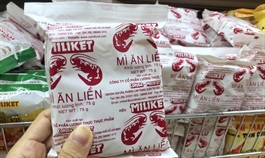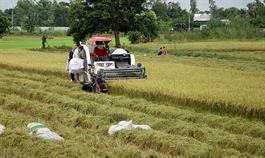Lack of raw materials limits supply of instant noodle
Lack of raw materials limits supply of instant noodle
Enterprises producing dried foods are struggling to meet increased demand caused by social distancing measures, due to a lack of raw materials.

Kajiwara Junichi, General Director of Acecook Vietnam Co told VnEconomy that the implementation of the "3 on-site" model, as part of the businesses continuity arrangements while social distancing measures are in place, has made the company's total production output decrease.
Currently, the number of employees participating in the "3 on-site" model accounts for only half of his company’s total workforce, he said.
This has led to reduced output and a failure to meet market demand. Meanwhile, some cases of COVID-19 infection were detected among their transport partners. This has affected the delivery of goods between branches of the company and to its distributors and supermarkets, he added.
Saigon Aquatic Product Trading JSC is also facing the same problem.
VnEconomy cited the company’s general director Truong Tien Dung as saying that his company was forced to close a facility producing fish cakes, canned and dried goods due to lack of raw materials. This resulted in a shortage of these products in its retail chains such as food stores and supermarkets.
In order to overcome this challenge, his firm is looking for alternative sources of raw materials to make up for the current shortage, Dung said.
At a recent online meeting in HCM City, Ly Kim Chi, President of the Food and Foodstuff Association of Ho Chi Minh City (FFA), said that up to now, many food companies have still maintained their production. However, some of them that implemented the "3-on-site" model could only utilise 50-60 per cent of their workforce, resulting in shortages of goods.
Insufficient raw materials were also problematic, according to the FFA.
It explained that producing a food product required many different types of raw materials. Raw material suppliers could shut down production at any time if they had F0 infected cases. Without a certain type of key raw material, businesses might have to stop their production altogether. That meant consumer goods and essential foodstuffs would be insufficient.
Chi cited a field of green onions in Ba Ria-Vung Tau Province as an example. In the pre-pandemic period, traders would come to that field to buy green onions and transport onions to factories in HCM City by trucks. However, amid the pandemic traders could not rent trucks to transport onions. That resulted in an inadequate source of green onion, causing difficulties for instant noodles producers who needed the green onion to make the seasoning.
In order to deal with this issue, food businesses petitioned the State management agencies to allow them to temporarily find alternative sources of auxiliary materials such as spices, flavourings and additives or adjust the appropriate quantity of materials while ensuring the quality, safety and basic characteristics of food products so that they would not affect the health of users.
For example, for instant noodles, food firms could reduce the number of auxiliary materials such as dried green onion and pepper, depending on the supply available, if the material suppliers stopped operation, Chi said.
Under the Food Safety Law and related regulations, with the above adjustments, companies had to redo the procedures for self-declaration of products and change the packaging, according to Chi.
However, doing this right now would take a long time, Chi said, adding that the cost of reprinting packaging would be very high. Meanwhile, it was so wasteful to discard old packaging, leading to the possibility that companies had to temporarily shut down production.
Thus, the FFA petitioned the State management agencies to replace the above procedures by allowing businesses to send detailed written reports to the agencies along with offering transparent information for consumers.
In particular, it suggested HCM City authorities deliver forecasts on market demand while drawing consumption plans and then proposing to neighbouring provinces that they expand their scale of production.
It was also necessary to set up a working group that would be responsible for solving difficulties for businesses in a timely manner and a hotline to receive information. That would help prevent the disruption of production and trade chains in the current context.
The city also needed to foster stronger exchanges and partnerships with neighbouring provinces with large supplied of raw material, Chi added.



























